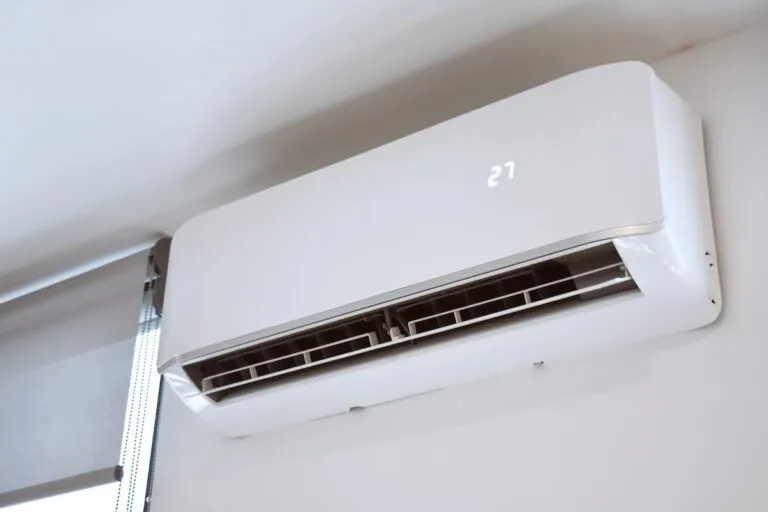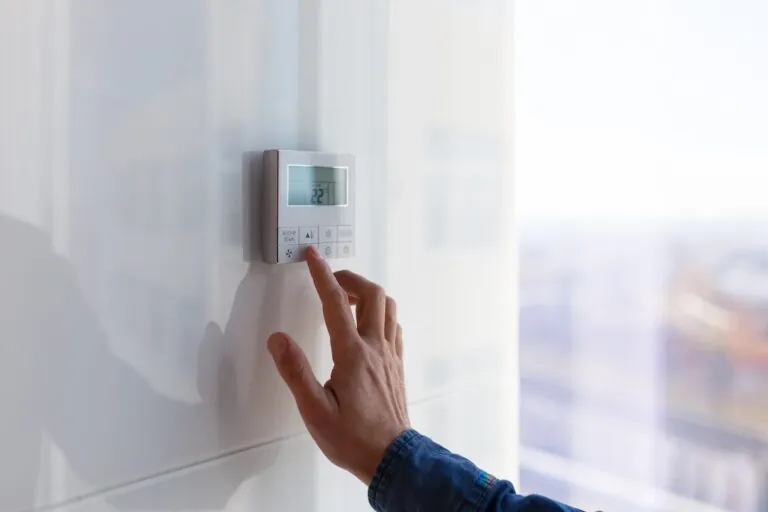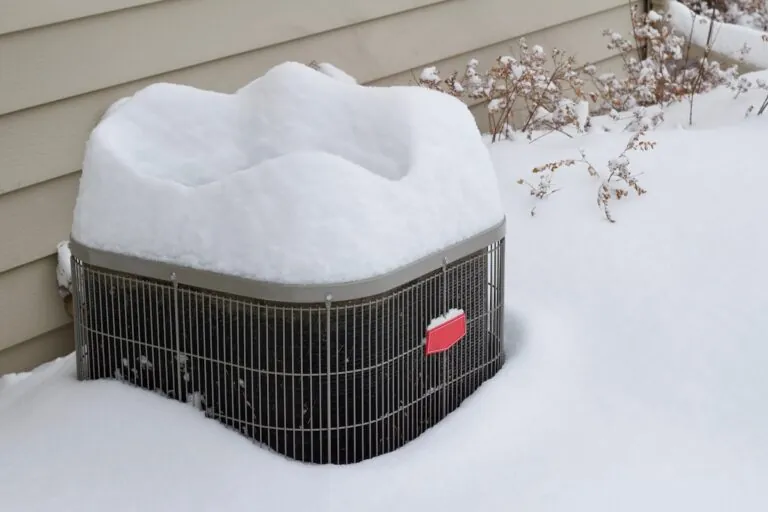If you’ve ever walked outside to find your air conditioner covered in ice—on a hot day no less—you’re not alone. An AC freezing up is more common than most homeowners realize, and it’s usually a sign that something isn’t working the way it should. Ironically, the same system designed to keep your home cool can become too cold and freeze over entirely.
Understanding why this happens, and what to do about it, can help prevent costly damage to your HVAC system and restore your home’s comfort quickly.
- AC freezing is often caused by low refrigerant, poor airflow, or mechanical issues.
- Older air conditioners that use R-22 refrigerant are more prone to freezing.
- A frozen air conditioner should be addressed promptly to avoid permanent damage.
❄️ What Does It Mean When Your AC Freezes Up?
When an air conditioner freezes, it typically means ice has formed on the evaporator coil or refrigerant lines. This happens when the system’s internal pressure drops too low, causing moisture in the air to freeze instead of evaporate.
The evaporator coil is responsible for absorbing heat from your home’s air. When that heat transfer process is disrupted—due to airflow issues or refrigerant problems—ice can form and spread throughout the system.
And while it might sound harmless (after all, it’s just ice, right?), a frozen AC can block airflow, reduce cooling, damage the compressor, and eventually cause the entire system to shut down.
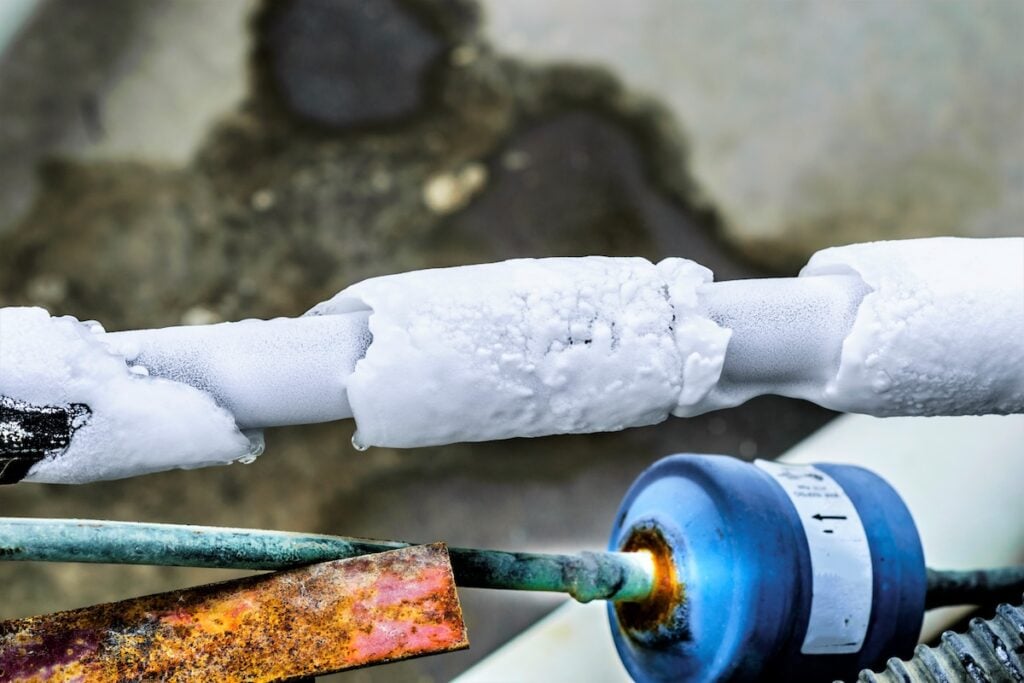
👉 Common Reasons Your AC Is Freezing Up
There’s more than one possible cause for a frozen air conditioner. Some are simple to fix, while others may require a professional inspection and repair. Here are the most common culprits:
Low Refrigerant or Refrigerant Leaks
This is one of the most frequent causes of an AC freezing up—especially in older systems still using R-22 refrigerant. When refrigerant levels drop, so does the pressure inside the evaporator coil. This pressure drop lowers the coil’s temperature, which causes condensation to freeze on contact.
- Older units using R-22: These systems are more susceptible to leaks and pressure imbalances due to age and outdated components.
- How it leads to freezing: Without the proper amount of refrigerant, the coil gets too cold and causes moisture in the air to freeze rather than evaporate.
- What to do: Have a licensed HVAC technician check for leaks and recharge the system with the appropriate refrigerant (or discuss replacement if your unit still uses phased-out R-22).
Poor Airflow Over the Evaporator Coil
Your AC system needs a steady stream of warm indoor air to keep the evaporator coil from freezing. When airflow is restricted, the coil can drop below freezing and start accumulating ice.
- Dirty air filters: Clogged filters block airflow and make your system work harder than necessary.
- Blocked return vents: Furniture, rugs, or closed doors can obstruct return airflow, reducing circulation.
- Blower motor issues: A malfunctioning fan can prevent enough air from moving across the coil.
Running the AC in Cool Outdoor Temperatures
Air conditioners aren’t meant to operate in outdoor temperatures below 62°F. When they do, internal pressure drops too low, increasing the risk of freezing.
- Why it happens: Homeowners may forget the AC is still on during a cool spring evening or early fall day.
- What to do: If the weather outside is mild, consider opening windows or using a fan instead of running the AC.
Mechanical or Parts Failures
Like any mechanical system, an air conditioner has parts that can wear out or fail. When this happens, pressure and airflow within the system can change—causing ice buildup.
- Kinked refrigerant lines: Bent or restricted lines prevent refrigerant from flowing smoothly, leading to temperature drops.
- Blower fan imbalance: An unbalanced or failing fan can reduce air circulation across the coil.
- Thermostat malfunctions: If your thermostat isn’t reading temperatures accurately, your system may run longer than needed.
📋 Why R-22 Units Are Especially Vulnerable
Many older air conditioners still in service use R-22 (Freon), a refrigerant that has been phased out in the U.S. due to environmental concerns. These systems are more prone to freezing because they often suffer from:
- Outdated components: Older systems are more likely to leak or have worn-out valves.
- Unavailable refrigerant: R-22 is no longer being produced, making recharging expensive and difficult.
- Reduced efficiency: These units may not deliver the consistent pressure needed to prevent freezing, especially if airflow is poor.
If your AC still uses R-22 and is freezing up often, it may be time to consider replacing it with a modern, energy-efficient system that uses R-410A or another approved refrigerant.
⭐️ What Should You Do If Your AC Freezes?
If your air conditioner freezes up, the first thing to do is turn off the system to allow it to thaw. Running it while frozen can cause damage to the compressor or lead to a complete system failure.

Steps to Take Right Away
- Turn off the AC at the thermostat: Prevent further ice buildup and give the system time to defrost.
- Switch the fan to “On”: Running just the fan can help melt the ice faster by pushing warm air over the coil.
- Check your air filter: If it’s dirty, replace it to restore airflow.
- Inspect for blocked vents: Make sure furniture, rugs, or curtains aren’t blocking return or supply vents.
- Call a professional technician: If ice returns after thawing or if you suspect refrigerant issues, schedule a service appointment.
✅ Can a Frozen AC Be Prevented?
Yes—regular HVAC maintenance and seasonal tune-ups are the best way to prevent your AC from freezing. Here’s how to stay ahead of the issue:
- Change filters every 1–3 months: Clean filters are essential for healthy airflow.
- Schedule annual maintenance: A Genz-Ryan technician can clean the coils, check refrigerant levels, and inspect all system components.
- Keep vents clear: Avoid blocking airflow with furniture or closed doors.
- Monitor performance: If your AC struggles to cool or runs nonstop, it could be a warning sign of a bigger issue.
🤔 Why You Shouldn’t Ignore a Frozen Air Conditioner
A frozen AC isn’t just an inconvenience—it’s a sign of a deeper problem that can shorten your system’s lifespan or lead to expensive repairs. Continued freezing can result in:
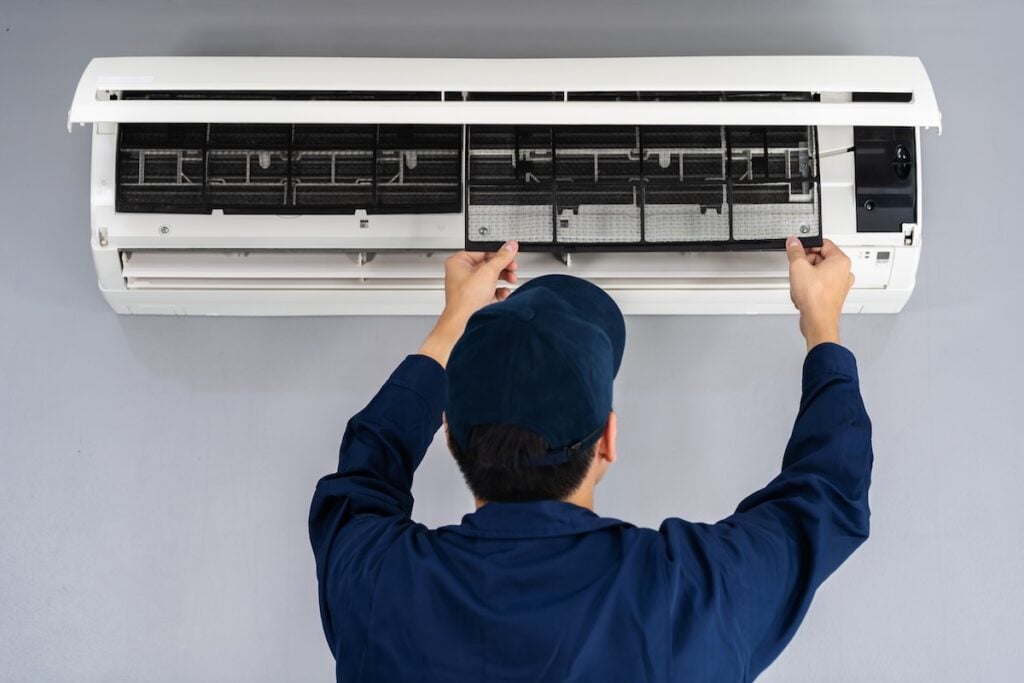
- Compressor damage: If your system runs while frozen, the compressor can overheat and fail.
- Refrigerant leaks: Freezing and thawing cycles can weaken joints and cause leaks over time.
- Inefficient cooling: Even when it seems to be working, a frozen AC can’t cool your home effectively.
Prompt diagnosis and repair are the best ways to protect your HVAC system and avoid costly downtime.
💪 Keep Your AC Running Smoothly All Season
An AC freezing up might seem strange, but it’s usually a clear signal that something’s off with airflow, refrigerant, or system performance. Whether you have an older R-22 unit or a newer system experiencing unexpected issues, don’t ignore the signs.
Genz-Ryan is your go-to HVAC partner for fast, honest, and expert service. If your air conditioner has frozen up or is showing early warning signs, contact us today to get a free quote. Let’s keep your home cool, safe, and ice-free.




